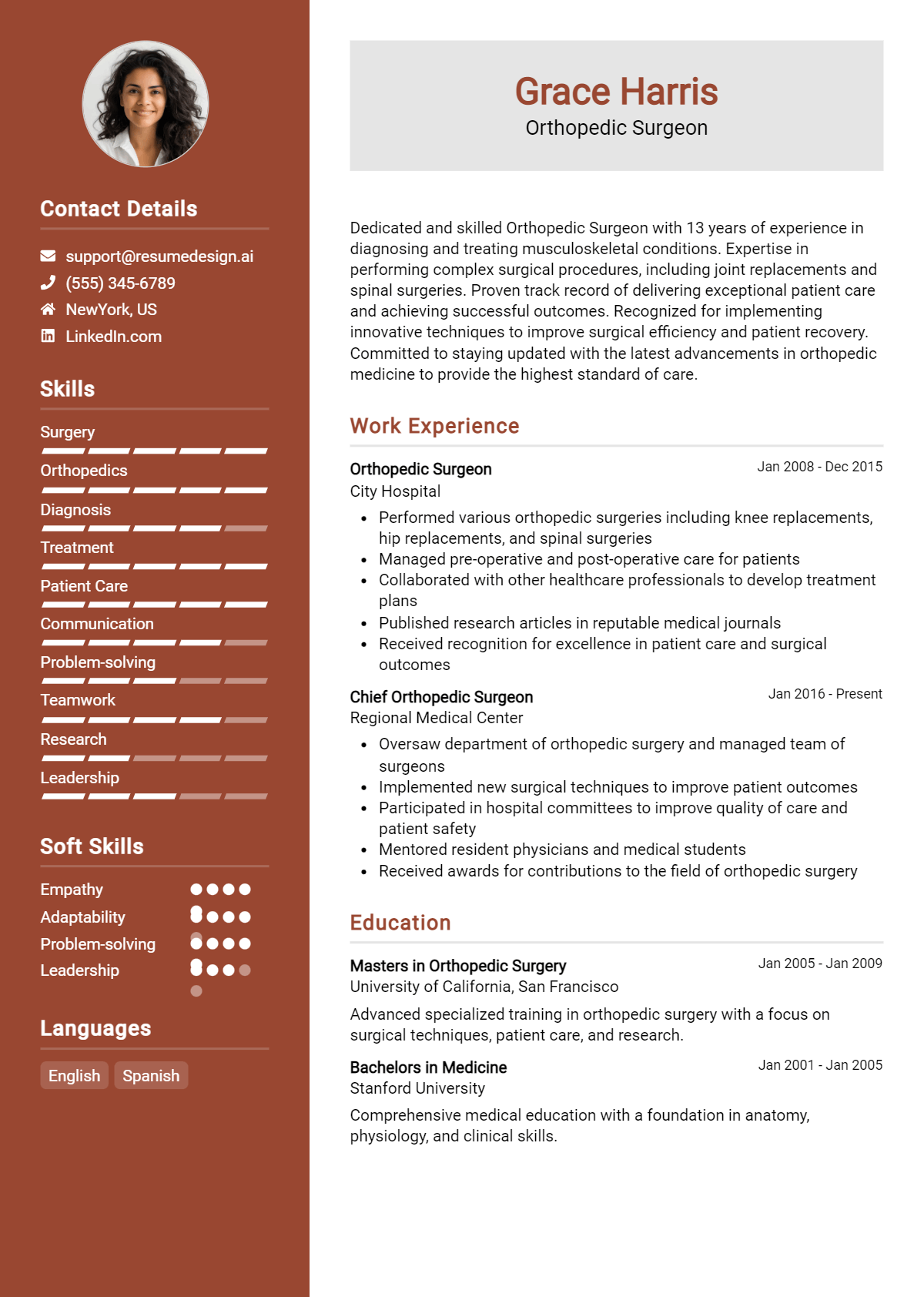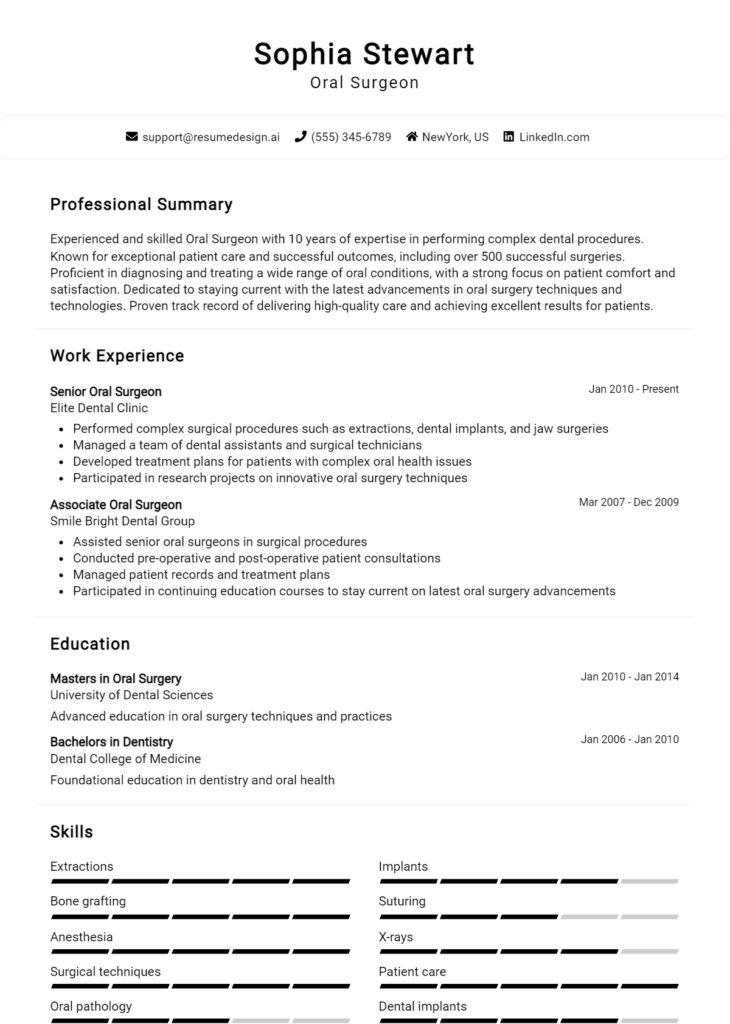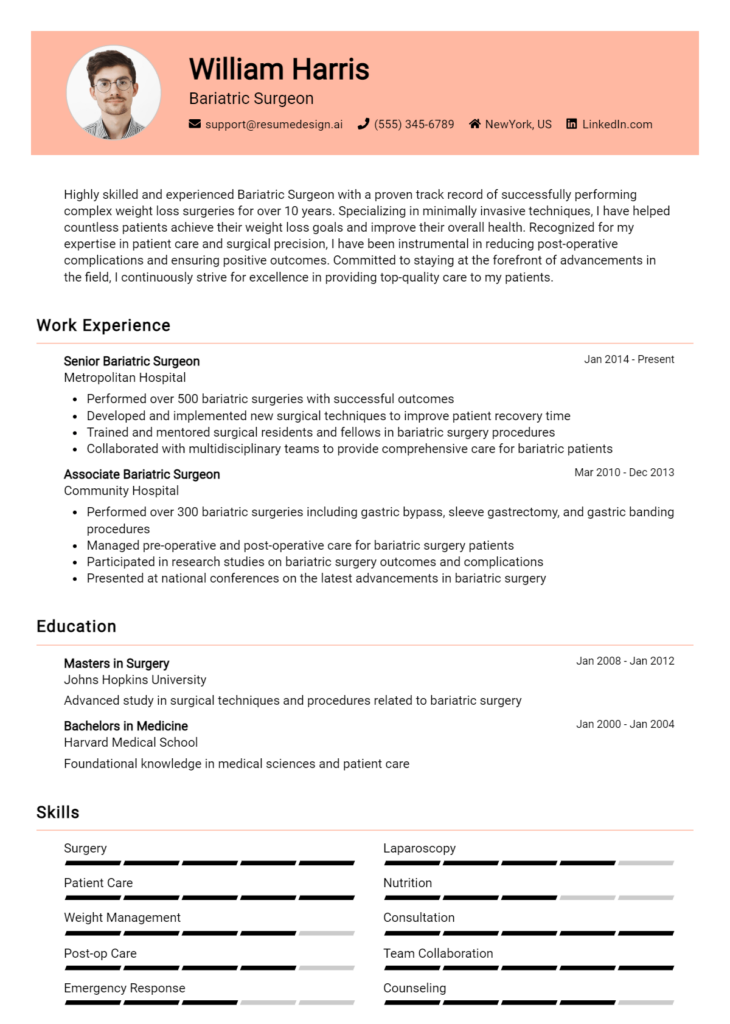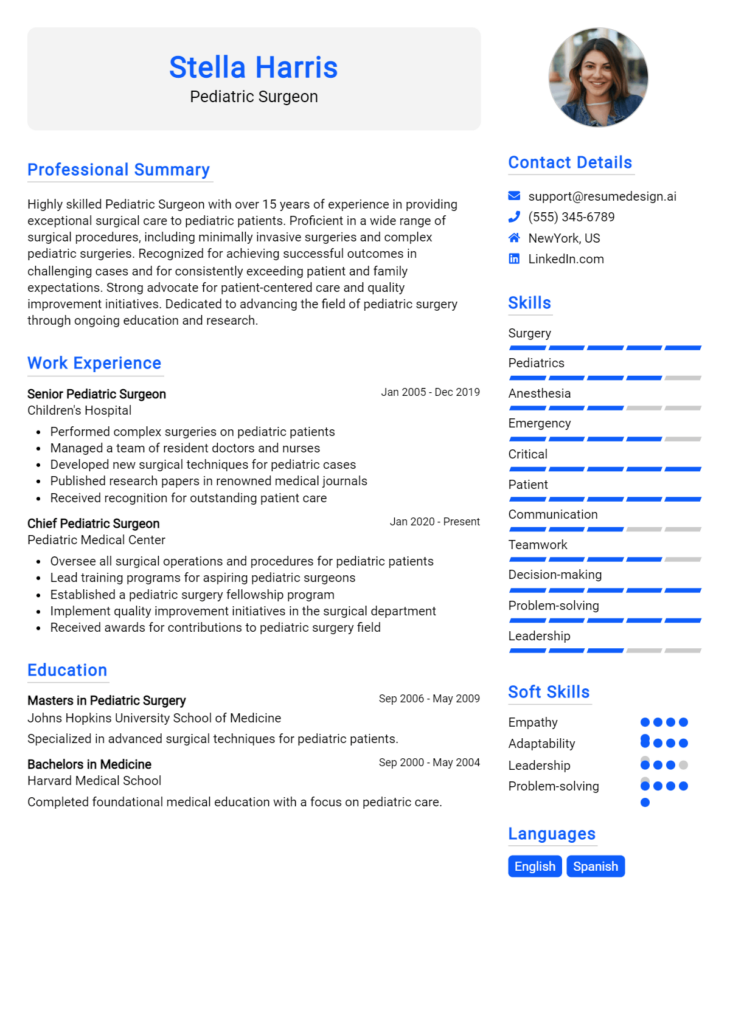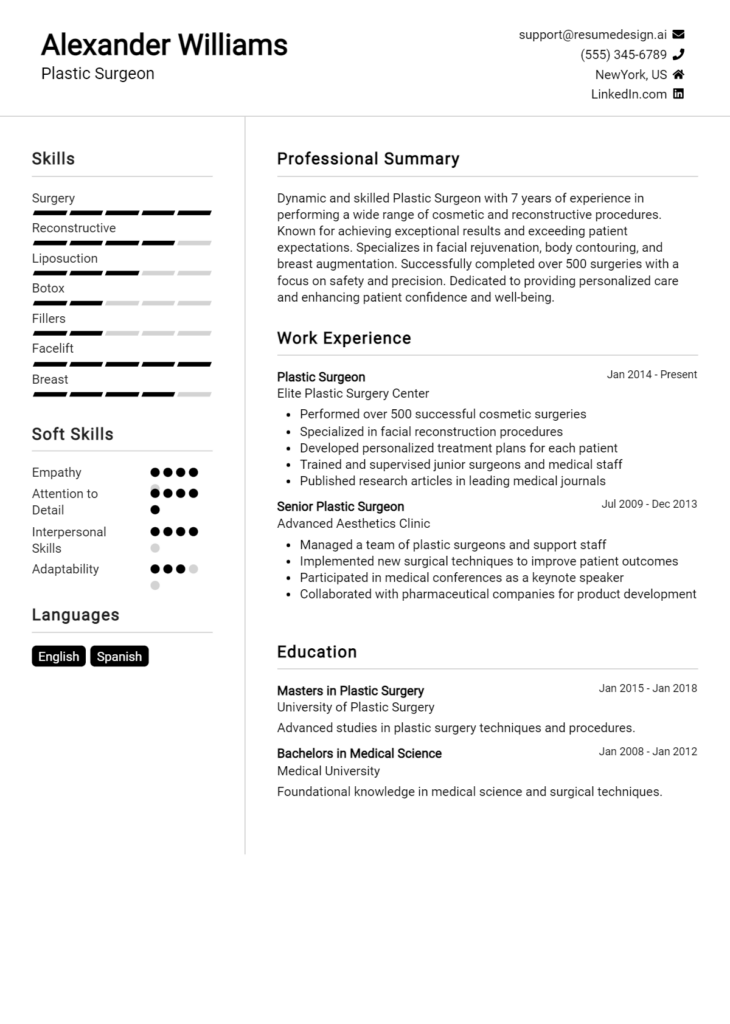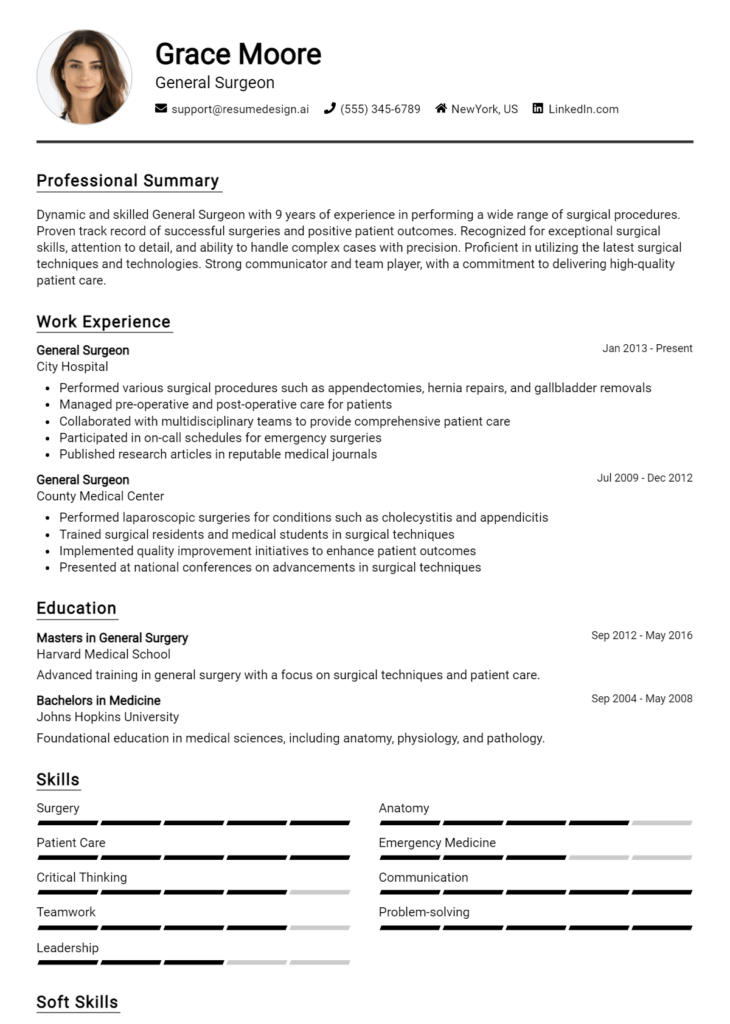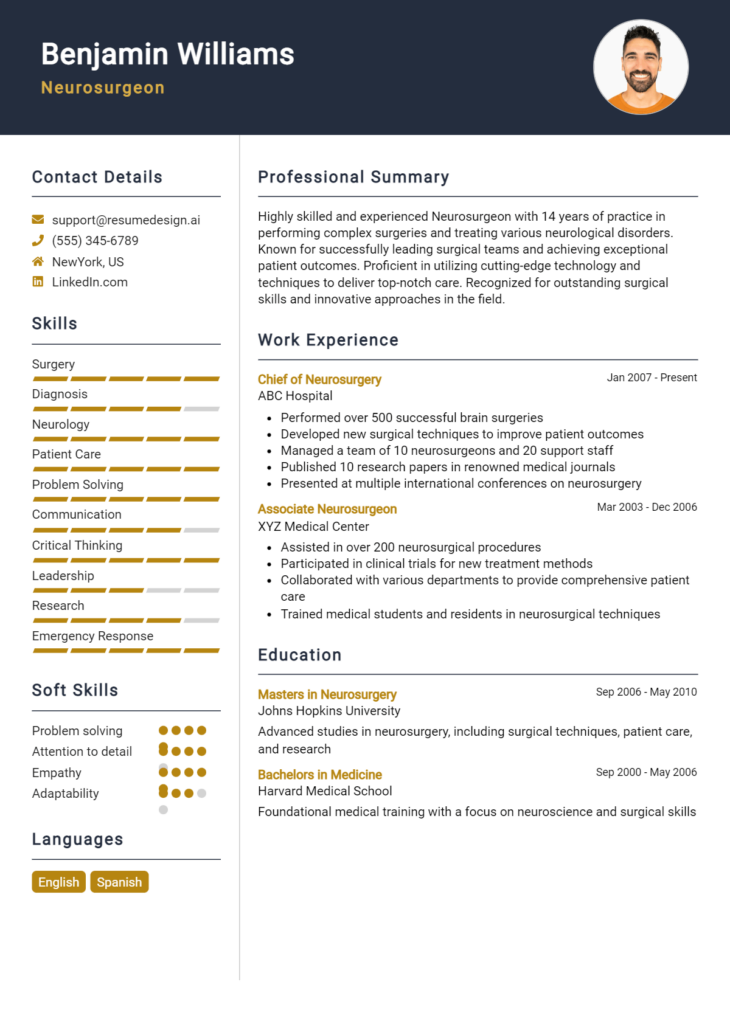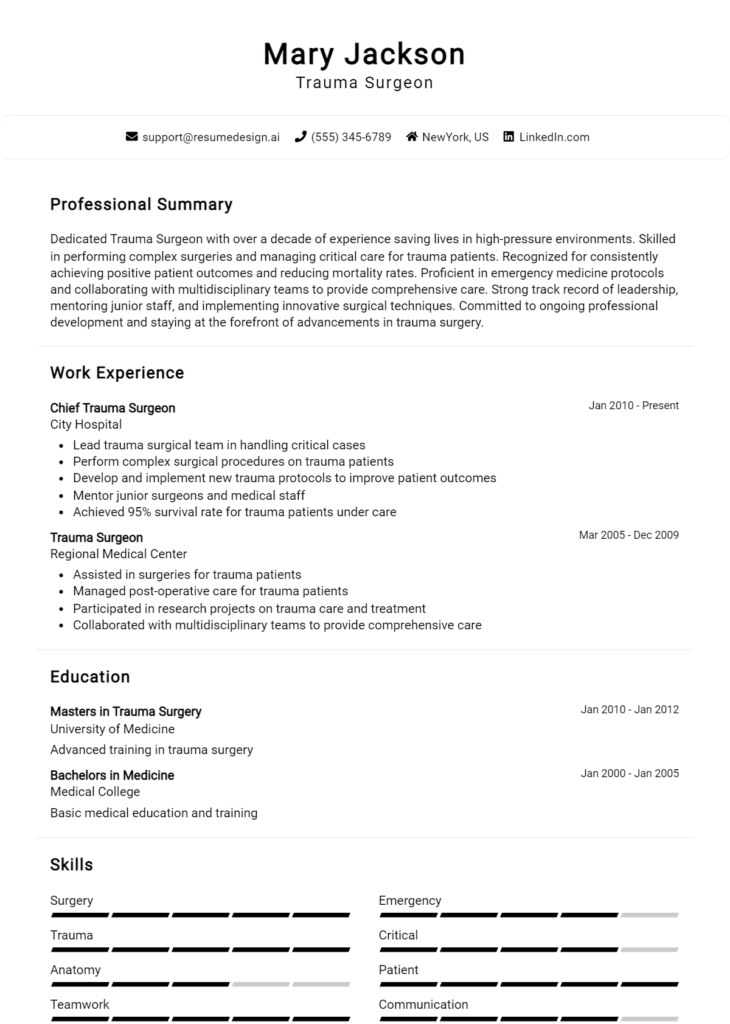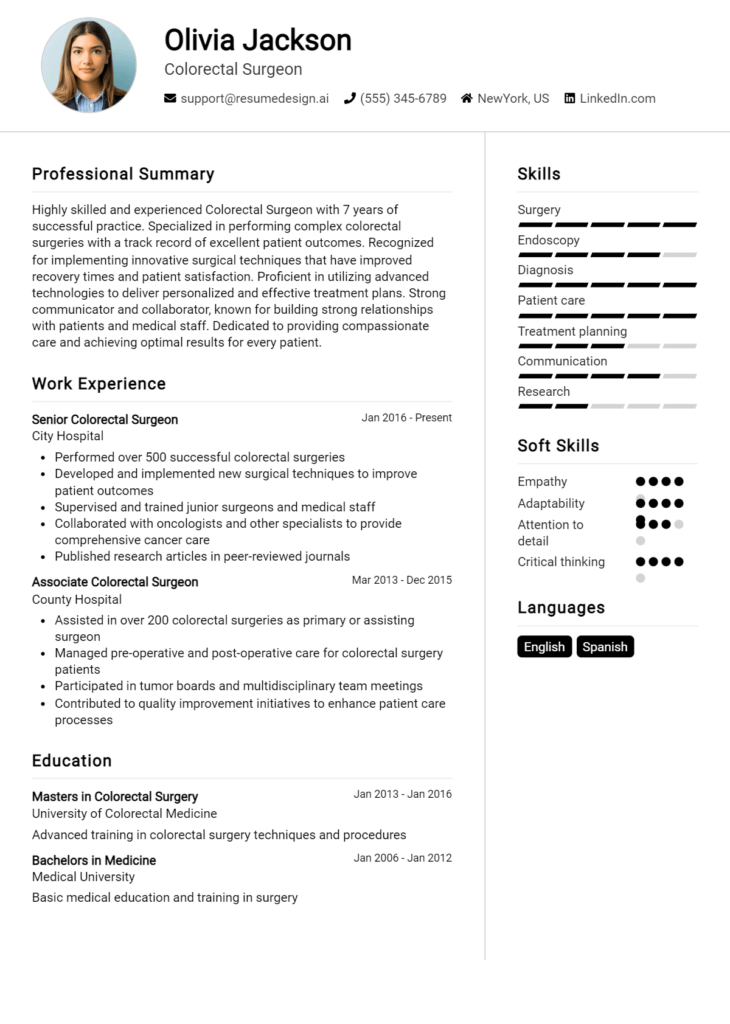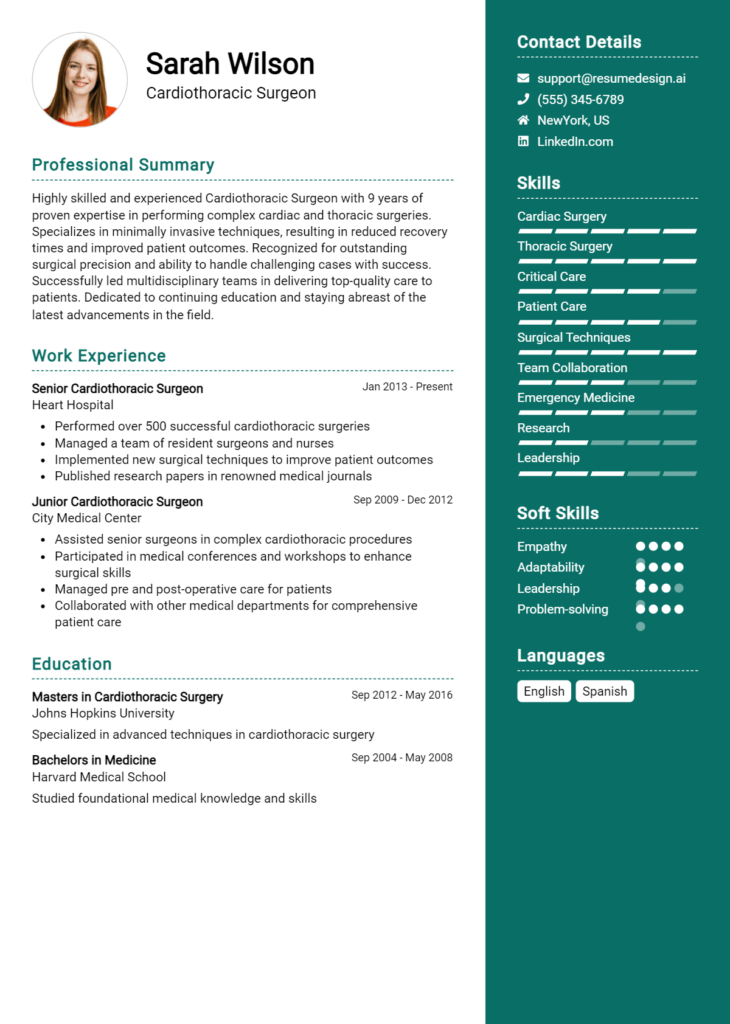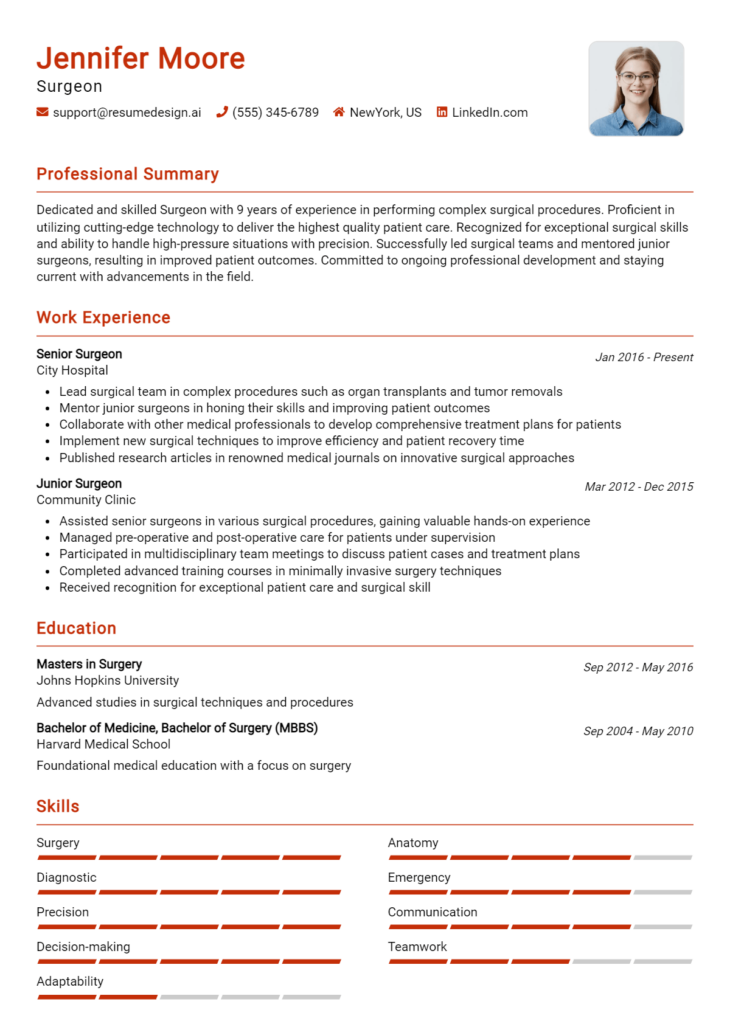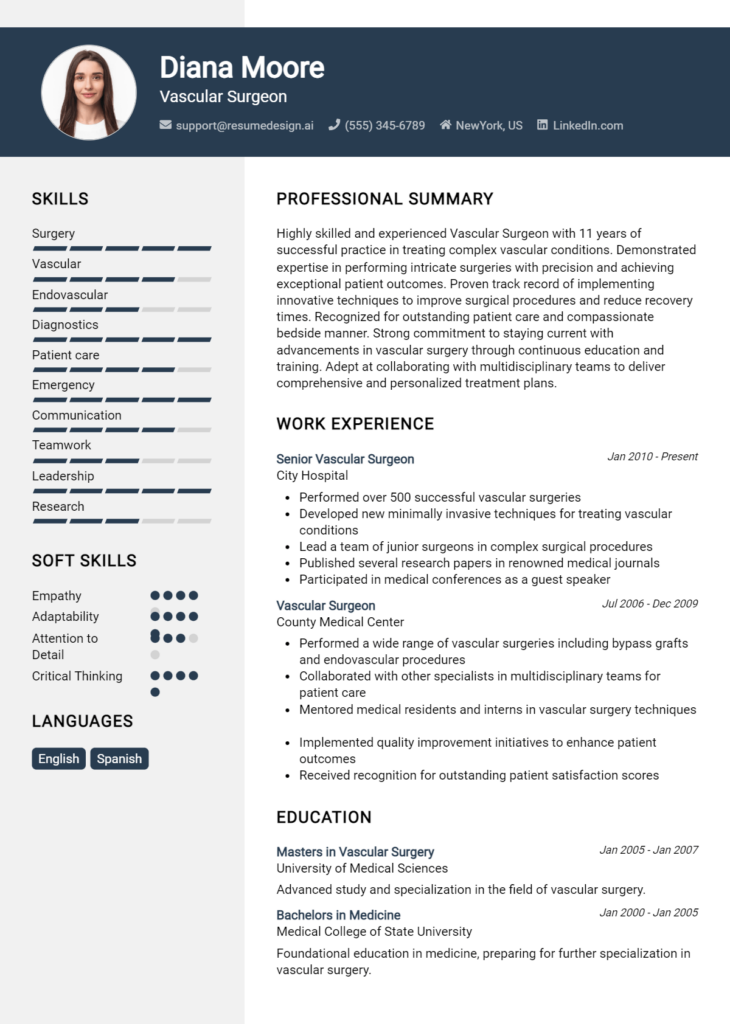Orthopedic Surgeon Core Responsibilities
Orthopedic Surgeons are responsible for diagnosing and treating musculoskeletal disorders, performing surgeries, and rehabilitating patients. They collaborate closely with various departments, including radiology, physical therapy, and pain management, to ensure comprehensive patient care. Essential skills include technical proficiency in surgical procedures, strong problem-solving abilities, and operational expertise in managing patient outcomes. These competencies are vital for aligning with the organization’s healthcare goals. A well-structured resume can effectively highlight these qualifications, making candidates stand out in a competitive field.
Common Responsibilities Listed on Orthopedic Surgeon Resume
- Conducting comprehensive patient assessments and diagnostics.
- Performing surgical procedures on bones, joints, and ligaments.
- Developing individualized treatment plans for patients.
- Collaborating with multidisciplinary teams for patient management.
- Monitoring post-operative recovery and rehabilitation progress.
- Utilizing advanced imaging and diagnostic tools.
- Providing education and counseling to patients and families.
- Staying updated on the latest orthopedic technologies and practices.
- Documenting patient care and maintaining accurate medical records.
- Participating in clinical research and continuing education.
- Managing complications and ensuring patient safety.
High-Level Resume Tips for Orthopedic Surgeon Professionals
In the competitive field of orthopedic surgery, a well-crafted resume is essential for making a strong first impression on potential employers. This document serves as your professional introduction, showcasing not just your skills and qualifications, but also your unique achievements that set you apart from other candidates. A resume that effectively reflects your expertise can significantly influence hiring decisions, making it crucial to present yourself in the best light. This guide will provide practical and actionable resume tips specifically tailored for orthopedic surgeon professionals, helping you to stand out in a crowded job market.
Top Resume Tips for Orthopedic Surgeon Professionals
- Tailor your resume to the specific job description by incorporating keywords and phrases that match the requirements outlined by the employer.
- Highlight your relevant experience, focusing on positions that directly relate to orthopedic surgery and demonstrating your expertise in the field.
- Quantify your achievements with specific metrics, such as the number of successful surgeries performed or patient recovery rates, to provide concrete evidence of your skills.
- Include industry-specific skills, such as proficiency in advanced surgical techniques, knowledge of orthopedic devices, and familiarity with the latest medical technologies.
- Utilize a clean and professional format that enhances readability, ensuring that your most important information stands out to hiring managers.
- Incorporate professional development experiences, such as fellowships, certifications, and continuing education courses that demonstrate your commitment to staying current in your field.
- Showcase your contributions to research or publications, which can highlight your dedication to advancing orthopedic medicine and your ability to engage with the academic community.
- Emphasize your soft skills, such as communication, teamwork, and problem-solving abilities, which are crucial for effective patient care and collaboration with healthcare teams.
- Keep your resume concise, ideally no longer than one to two pages, focusing on the most relevant information to capture the attention of busy hiring committees.
By implementing these resume tips, orthopedic surgeon professionals can significantly enhance their chances of landing a job in this specialized field. A well-structured and targeted resume not only showcases your qualifications but also demonstrates your dedication to the profession and your potential contributions to a healthcare team.
Why Resume Headlines & Titles are Important for Orthopedic Surgeon
In the competitive field of orthopedic surgery, a well-crafted resume headline or title plays a crucial role in capturing the attention of hiring managers. A strong headline serves as the first impression of a candidate’s qualifications, summarizing their key skills and experiences in a concise and impactful way. It should be directly related to the job being applied for, allowing hiring managers to immediately recognize the candidate's relevance and suitability for the position. A compelling headline not only stands out but also sets the tone for the rest of the resume, encouraging further exploration of the applicant’s background.
Best Practices for Crafting Resume Headlines for Orthopedic Surgeon
- Keep it concise: Aim for a headline that is no more than 10-15 words.
- Be role-specific: Use terminology and keywords relevant to orthopedic surgery.
- Highlight key qualifications: Focus on your most impressive skills and experiences.
- Incorporate metrics: If applicable, include quantifiable achievements to boost credibility.
- Use strong action verbs: Start with powerful words that convey your expertise.
- Tailor for each application: Customize your headline for the specific job to which you're applying.
- Maintain professionalism: Ensure your headline reflects a serious and professional tone.
- Avoid jargon: Use clear language that can be easily understood by hiring managers.
Example Resume Headlines for Orthopedic Surgeon
Strong Resume Headlines
Board-Certified Orthopedic Surgeon Specializing in Minimally Invasive Techniques
Experienced Orthopedic Surgeon with 10+ Years in Joint Reconstruction and Sports Medicine
Dedicated Orthopedic Surgeon Committed to Patient-Centered Care and Advanced Surgical Solutions
Weak Resume Headlines
Orthopedic Surgeon Looking for a Job
Experienced Doctor in Healthcare
The strong headlines are effective because they immediately communicate specific qualifications and areas of expertise, making them relevant and enticing to hiring managers. They are tailored to the orthopedic surgery field and convey a sense of professionalism and accomplishment. In contrast, the weak headlines fail to impress due to their vagueness and lack of specificity, leaving hiring managers without a clear understanding of the candidate's unique strengths or what they bring to the table. A strong resume headline can be the difference between being noticed or overlooked in a competitive job market.
Writing an Exceptional Orthopedic Surgeon Resume Summary
An effective resume summary is crucial for orthopedic surgeons as it serves as the first impression for hiring managers and recruiters. This brief yet powerful introduction quickly captures attention by highlighting key skills, relevant experience, and notable accomplishments that align with the job requirements. A strong summary is concise, impactful, and specifically tailored to the position being applied for, making it an essential tool in showcasing a candidate's qualifications and setting them apart in a competitive job market.
Best Practices for Writing a Orthopedic Surgeon Resume Summary
- Quantify Achievements: Use numbers and statistics to demonstrate the impact of your work, such as successful surgeries or patient recovery rates.
- Focus on Skills: Highlight specific surgical techniques, patient management skills, and any specialized training relevant to orthopedic surgery.
- Tailor the Summary: Customize your summary for each job application by aligning your experiences and skills with the job description.
- Use Action Words: Begin sentences with strong action verbs to convey confidence and proactivity.
- Keep it Concise: Aim for 2-4 sentences that effectively summarize your qualifications without unnecessary details.
- Highlight Professional Development: Mention continuing education, certifications, or training that enhance your credentials.
- Showcase Leadership: If applicable, refer to any leadership roles or mentoring experiences that demonstrate your ability to guide others in the field.
- Maintain a Professional Tone: Ensure your summary reflects professionalism while still conveying your passion for orthopedic surgery.
Example Orthopedic Surgeon Resume Summaries
Strong Resume Summaries
Board-certified orthopedic surgeon with over 10 years of experience specializing in joint replacement and arthroscopic surgery. Successfully performed over 1,500 procedures with a 98% patient satisfaction rate, significantly improving mobility and quality of life for patients.
Dedicated orthopedic surgeon with expertise in sports medicine and a proven track record of reducing recovery times by 30% through innovative rehabilitation protocols. Recognized for leading a team in a multi-disciplinary clinic, enhancing patient outcomes in post-operative care.
Experienced orthopedic surgeon skilled in minimally invasive techniques, having completed 200+ successful surgeries in the past year alone. Committed to patient education and postoperative follow-up, resulting in a 95% adherence rate to rehabilitation plans.
Weak Resume Summaries
Orthopedic surgeon with a lot of experience and skills in various surgeries, looking for a new opportunity in a hospital.
I am a surgeon who has worked in orthopedic surgery for many years and have done many surgeries. I want to help patients.
The examples of strong resume summaries are considered effective because they provide specific details about the candidate's experience, quantify achievements, and highlight relevant skills tailored to orthopedic surgery. In contrast, the weak summaries lack specificity and measurable outcomes, making them appear generic and unremarkable. By focusing on quantifiable successes and relevant skills, strong summaries can significantly enhance a candidate's job prospects.
Work Experience Section for Orthopedic Surgeon Resume
The work experience section of an Orthopedic Surgeon resume is crucial as it provides potential employers with insight into a candidate's technical skills, leadership capabilities, and their commitment to delivering high-quality patient outcomes. This section not only highlights the candidate's clinical expertise in orthopedic procedures but also demonstrates their ability to effectively manage surgical teams and collaborate with multidisciplinary professionals. Quantifying achievements, such as the number of successful surgeries performed or improvements in patient recovery times, is essential to align the candidate’s experience with industry standards and establish credibility in a competitive field.
Best Practices for Orthopedic Surgeon Work Experience
- Focus on quantifiable achievements, such as the number of surgeries performed or patient recovery statistics.
- Highlight specific technical skills relevant to orthopedic surgery, including specialized procedures and technologies.
- Demonstrate leadership experience by detailing roles in managing surgical teams or mentoring junior staff.
- Use action verbs to convey a sense of proactivity and impact in every listed responsibility.
- Tailor each experience to reflect alignment with the job description and industry standards.
- Include collaborative efforts with other healthcare professionals that showcase teamwork and communication skills.
- Utilize concise language to maintain clarity and professionalism throughout the section.
- Provide context for each role, including the type of facility, patient demographics, and complexity of cases handled.
Example Work Experiences for Orthopedic Surgeon
Strong Experiences
- Performed over 300 successful total joint replacement surgeries annually, achieving a 95% patient satisfaction rate post-operation.
- Led a team of 10 surgical staff in implementing a new minimally invasive technique, resulting in a 20% reduction in patient recovery time.
- Collaborated with physical therapists to develop post-operative rehabilitation protocols, improving patient mobility outcomes by 30% within 6 weeks.
- Trained and mentored 5 orthopedic residents, enhancing their surgical skills and clinical judgment, as evidenced by their improved performance in evaluations.
Weak Experiences
- Assisted in surgeries and worked with patients.
- Performed a variety of orthopedic procedures.
- Collaborated with medical staff to provide care.
- Responsible for patient follow-up after surgery.
The examples labeled as strong are considered effective because they present specific, quantifiable outcomes that demonstrate the candidate's technical leadership and collaborative skills. They convey the impact of the candidate's work in a measurable way, which is highly valued in the medical field. In contrast, the weak experiences are vague and lack detail, failing to showcase any significant accomplishments or specific skills, making them less compelling to potential employers.
Education and Certifications Section for Orthopedic Surgeon Resume
The education and certifications section of an Orthopedic Surgeon resume is crucial as it showcases the candidate's academic achievements, relevant certifications, and commitment to continuous professional development. This section not only highlights the foundational knowledge gained through rigorous training but also emphasizes specialized skills and competencies that are essential in the field of orthopedic surgery. By including pertinent coursework, industry-recognized certifications, and any advanced training, candidates can significantly enhance their credibility and demonstrate their alignment with the specific demands of the job role.
Best Practices for Orthopedic Surgeon Education and Certifications
- List relevant degrees in a clear and concise manner, emphasizing advanced education such as MD or DO.
- Highlight board certifications, particularly from recognized bodies like the American Board of Orthopaedic Surgery.
- Include specialized training or fellowships relevant to orthopedic surgery, such as sports medicine or joint replacement.
- Provide details on relevant coursework that reflects a deep understanding of orthopedic principles and practices.
- Keep the format consistent and easy to read, using bullet points for clarity.
- Update the section regularly to reflect new certifications or educational pursuits.
- Consider including continuing education credits or workshops attended that relate to orthopedic advancements.
- Ensure that all information is accurate and verifiable, as this reflects professionalism and integrity.
Example Education and Certifications for Orthopedic Surgeon
Strong Examples
- Doctor of Medicine (MD), Harvard Medical School, 2015
- Board Certified in Orthopedic Surgery, American Board of Orthopaedic Surgery, 2018
- Fellowship in Sports Medicine, Mayo Clinic, 2019
- Relevant Coursework: Advanced Musculoskeletal Anatomy, Surgical Techniques in Orthopedics
Weak Examples
- Bachelor of Arts in History, State University, 2010
- Certification in First Aid, 2020
- Basic Life Support (BLS) Certification, 2018
- General Surgery Residency without Orthopedic Focus, 2017
The strong examples are considered effective because they directly relate to the qualifications needed for an orthopedic surgeon, showcasing advanced degrees and specialized training. They demonstrate the candidate's commitment to the field and their readiness for advanced practice. In contrast, the weak examples lack relevance to orthopedic surgery, with degrees and certifications that do not enhance the candidate’s qualifications for the role. These examples fail to reflect the necessary expertise and specialized knowledge required in orthopedic practice, which can diminish the candidate's appeal to potential employers.
Top Skills & Keywords for Orthopedic Surgeon Resume
The role of an orthopedic surgeon is both demanding and rewarding, requiring a unique combination of technical expertise and interpersonal abilities. A well-crafted resume that highlights relevant skills can significantly enhance a surgeon's chances of landing a position in a competitive field. Skills are essential not only for demonstrating proficiency in surgical techniques and patient care but also for showcasing the ability to communicate effectively with patients, families, and healthcare teams. A strong focus on both hard and soft skills in an orthopedic surgeon's resume can help convey a comprehensive picture of their capabilities and experiences, ultimately leading to successful job placements.
Top Hard & Soft Skills for Orthopedic Surgeon
Soft Skills
- Communication
- Empathy
- Teamwork
- Problem-solving
- Stress management
- Attention to detail
- Adaptability
- Time management
- Leadership
- Patient education
- Conflict resolution
- Decision-making
- Active listening
- Emotional intelligence
- Compassion
Hard Skills
- Surgical techniques (e.g., arthroscopy, joint replacement)
- Patient assessment and diagnosis
- Anesthesia administration
- Postoperative care
- Radiology interpretation
- Orthopedic trauma management
- Medical documentation
- Familiarity with orthopedic hardware and implants
- Knowledge of rehabilitation protocols
- Use of medical software and technologies
- Research and clinical trials
- Regulatory compliance
- Risk management
- Physical examination techniques
- Procedural sedation
For more detailed insights on the importance of skills and how to effectively showcase your work experience, consider exploring additional resources tailored for medical professionals.
Stand Out with a Winning Orthopedic Surgeon Cover Letter
Dear [Hiring Manager's Name],
I am writing to express my interest in the Orthopedic Surgeon position at [Hospital/Clinic Name] as advertised on [where you found the job listing]. With over [number] years of experience in the field, I have honed my skills in diagnosing and treating musculoskeletal conditions, performing a wide range of surgical procedures, and collaborating effectively with multidisciplinary teams to provide the highest standard of patient care. My commitment to continuous learning and adapting to the latest advancements in orthopedic surgery positions me as an ideal candidate for your esteemed institution.
Throughout my career, I have successfully managed complex cases involving joint replacements, trauma, and sports-related injuries. My approach combines cutting-edge surgical techniques with a compassionate focus on patient education and rehabilitation. I take pride in my ability to develop individualized treatment plans that empower patients to regain their mobility and improve their quality of life. Furthermore, I have actively participated in clinical research, contributing to our understanding of orthopedic conditions and enhancing treatment protocols, which I believe aligns with [Hospital/Clinic Name]'s mission of providing innovative healthcare solutions.
I am particularly impressed with [specific aspect of the hospital/clinic, such as its commitment to patient-centered care, community outreach, or a renowned research program], and I am eager to contribute my expertise to your team. I believe that my proactive approach to patient care, combined with my clinical skills and passion for orthopedic surgery, would make me a valuable asset to [Hospital/Clinic Name]. I look forward to the opportunity to discuss how my background, skills, and enthusiasms align with your needs.
Thank you for considering my application. I am excited about the possibility of joining [Hospital/Clinic Name] and contributing to the exceptional care provided to your patients. I hope to discuss my candidacy further in an interview and can be reached at [your phone number] or [your email address].
Sincerely,
[Your Name]
[Your LinkedIn Profile or Professional Website, if applicable]
Common Mistakes to Avoid in a Orthopedic Surgeon Resume
When applying for a position as an orthopedic surgeon, crafting an effective resume is crucial to making a strong impression on hiring committees. However, many candidates fall into common pitfalls that can undermine their qualifications and experience. Understanding these mistakes can help you present a polished and professional resume that highlights your skills and accomplishments in the best light. Here are some common mistakes to avoid when creating your orthopedic surgeon resume:
Generic Objective Statement: Using a vague objective statement fails to convey your specific goals and can make your resume blend in with others. Tailor your statement to reflect your aspirations in the orthopedic field.
Lack of Specificity: Omitting details about your surgical procedures, techniques, or technologies used can result in a lack of clarity about your expertise. Be specific about the types of surgeries you've performed and your areas of specialization.
Ignoring Keywords: Many healthcare facilities use applicant tracking systems (ATS) to screen resumes. Not incorporating relevant keywords from the job description can lead to your resume being overlooked.
Inconsistent Formatting: A poorly formatted resume can be distracting and difficult to read. Ensure consistency in font style, size, and spacing throughout the document to maintain a professional appearance.
Overly Technical Language: While it's important to demonstrate your medical knowledge, using excessive jargon can alienate readers who may not be familiar with certain terms. Aim for a balance that showcases your expertise while remaining accessible.
Neglecting Soft Skills: Focusing solely on clinical skills and neglecting soft skills, such as communication and teamwork, can paint an incomplete picture of your capabilities. Highlighting these skills is essential for working effectively in a healthcare team.
Listing Responsibilities Instead of Achievements: Merely listing job responsibilities does not demonstrate your impact or contributions. Instead, focus on quantifiable achievements that showcase your success in previous roles.
Failure to Tailor for Each Application: Sending out the same resume for different positions can be detrimental. Tailor your resume for each application to emphasize the most relevant experience and skills for that specific role.
Conclusion
As an Orthopedic Surgeon, your expertise in diagnosing and treating musculoskeletal conditions is vital to improving patients' quality of life. Throughout this article, we've explored the essential skills, qualifications, and experiences that define a successful orthopedic surgeon. Key points include the importance of advanced surgical techniques, the need for continuous education to stay updated with the latest medical advancements, and the value of effective communication with patients and healthcare teams.
In conclusion, as you reflect on your career and consider your next professional opportunity, it's crucial to ensure that your resume effectively showcases your qualifications and experiences. Take a moment to review your Orthopedic Surgeon Resume and ensure it highlights your unique skills and achievements.
To assist you in this process, consider utilizing available resources such as resume templates, a user-friendly resume builder, and resume examples tailored for medical professionals. Additionally, don't forget the importance of a compelling cover letter—check out cover letter templates to help you stand out in your job search.
Take action today and refine your resume to reflect the exceptional orthopedic surgeon you are!

